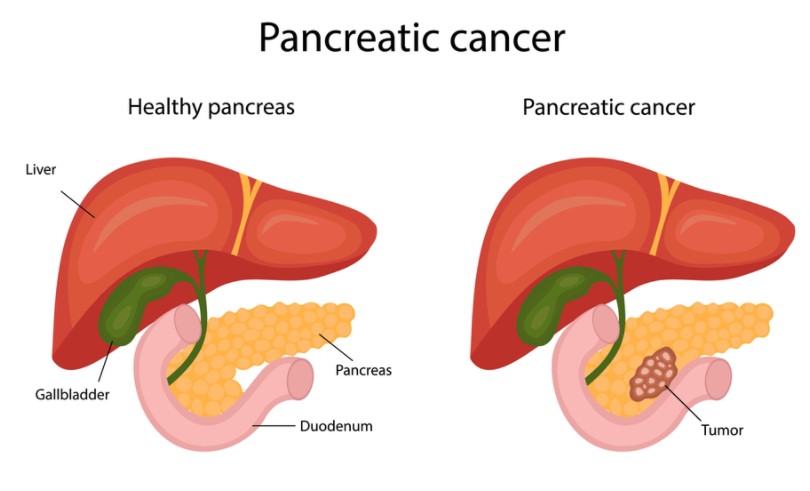
In this article, you will find information about pancreatic cancer, causes, diagnosis and treatment cost in India.
It is a leading cause of cancer-related death, with a terrible overall prognosis that has remained practically constant for decades. Prevention or early identification at a curable stage is extremely difficult as patients seldom exhibit symptoms. Also, tumors lack sensitive and specific indicators to facilitate detection.
Let’s understand more in detail.
What is Pancreatic Cancer?
Pancreatic cancer develops when healthy cells in the pancreas divide uncontrollably, generating a lump known as a tumor. The most prevalent kind of pancreatic cancer, ductal adenocarcinoma, starts in the cells lining the pancreatic ducts.
Abdominal pain, decreased appetite or energy level, unexplained weight loss, and/or jaundice (yellowing of the skin and/or eyes) are signs or symptoms of pancreatic cancer. Pancreatic cancer is generally diagnosed after it has spread to other regions of the body.
Poor prognosis is attributed to difficulties in diagnosis, the inability of most tumors to be resected, and a lack of alternative viable nonsurgical treatment options. Understanding its symptoms is therefore important.
Symptoms
Pancreatic cancer is often detected at an advanced stage. This might be attributed to a variety of circumstances. Diagnostic testing does not provide the sensitivity or specificity required for early detection. Typically, pancreatic cancer does not manifest itself until it has progressed to an advanced stage. However, if you have any of the following symptoms:
- sudden weight loss
- Extensive abdominal pain
- Jaundice (characterized by a yellow coloring of the skin and eyes)
- pain in the lower back
- Clots in the blood
- Appetite loss
- Skin itch
- Mental disturbances such as mood swings, melancholy, exhaustion, and lethargy
Consult your doctor if you are experiencing any of these symptoms.
A closer look at the technical aspects tells us that more than two-thirds of pancreatic tumors develop in the pancreas head and typically manifested as slowly rising jaundice caused by bile duct blockage. Patients feel exhaustion, anorexia, and bruising when their hepatic function deteriorates due to a decrease in clotting factors.
Causes
The most common cause of pancreatitis is gallstones. Pancreatitis can also be caused by the following factors:
- Autoimmune disorder
- alcoholic beverages abuse
- Infections of the stomach
- Medications
- Metabolic disorders
- Trauma
Smoking, some cancer syndromes, and genetic chronic pancreatitis are all risk factors. The relationship between pancreatic cancer risk and other variables (such as diabetes and obesity) is less established. Tobacco use, diabetes, and obesity also raise the risk.
How to Diagnose Pancreatic Cancer?
A patient's history, physical exam, and serum bilirubin and alkaline phosphatase values can provide some hint about pancreatic cancer, but these are not diagnostic indicators. After reviewing your symptoms and medical history, your doctor may refer one or more tests to rule out pancreatic cancer. These tests include:
- Imaging examinations, such as CT or MRI scans which can provide a comprehensive and detailed picture of the pancreas.
- Endoscopic ultrasonography involving introduction of a small tube with a camera at one end down into the stomach to obtain a clear image of the pancreas.
- A pancreatic biopsy by removing a sample of tissue from the pancreas.
- CA 19-9 is detected in the blood by a blood test.
How is pancreatic cancer treated?
The size and location of the tumor, it's spread, and the person's general condition influence pancreatic cancer therapy.
Surgery, radiation therapy, and systemic medicines such as chemotherapy are the most prevalent pancreatic cancer treatments. Targeted treatment or immunotherapy may also be used to treat some subtypes of pancreatic cancer. Depending on the location and stage of the malignancy, surgery may require removing the whole or part of the pancreas, as well as adjacent lymph nodes.
If surgery is not suggested, chemotherapy and/or radiation therapy may be performed to reduce the size of a tumor, or to eliminate any residual cancer cells and minimize the odds of the disease recurrence.
Genetic counseling is suggested for a person who is newly diagnosed with pancreatic disease. A testing can also be included to see whether the disease may be passed down from generation to generation in a family.
What Makes Samadhan Clinic the Best Choice for Pancreatic Cancer Treatment in India?
SAMADHAN Clinic is one of the oldest Dental and Gastroenterology Centers in Dwarka, delivering ethical, inexpensive, and high-quality care. Dr Shri Ram Agrawal, the Best Gastroenterologist in Delhi offers gastroenterology services (M.D., D.M.) having almost 20 years of experience.
The department is outfitted with the most recent video endoscopes. All gastro and liver disorders, as well as endoscopic operations, are addressed at the clinic. Fujinon, HD Video endoscopes, Narrow Band Imaging (NBI), Pulse Oximeter (PO), Fibrosca, etc are available in the gastroenterology department.
With its expert doctors, modern equipment, skilled facilities, and smooth sterilization process, Samadhan Clinic is one of the best places to treat Pancreatic Cancer Treatment in India.
How much does pancreatic cancer treatment cost in India?
When surgery is included, Cancer necessitates a significant amount of treatment fees. The price range also varies from person to person depending on the stage of cancer.
- Stage 1 patients may incur charges ranging from Rs. 60,000 to Rs. 1,50,000 for drugs and therapy (annually).
- Patients in stage 2 range in price from Rs. 80,000 to Rs. 1,80,000. (annually).
- Patients with stage 3 cancer may incur charges of up to Rs. 2,50,000. (annually).
Typically, the cost of surgery ranges from Rs. 65,000 to Rs. 1,10,000.
There are additional fees for pancreatic cancer medications that vary from Rs. 2,500 to Rs. 4,000 (roughly) monthly.

